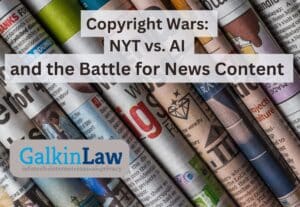
The New York Times (NYT) has recently sent a cease-and-desist notice to the AI startup Perplexity, accusing it of using their content to generate AI responses without authorization. This move reflects growing tensions between media outlets and AI developers regarding the use of copyrighted material to train large language models (LLMs) and generate summaries. Perplexity, a challenger to search giants like Google, uses web-scraping techniques to deliver AI-generated content summaries, including news articles, without requiring users to visit the source directly.
The Core Issue 📜
At the heart of the conflict is the allegation that Perplexity’s use of NYT content violates copyright law by repurposing the newspaper’s articles for AI-generated responses without proper licensing. This follows broader industry concerns, as AI technologies increasingly use publicly available data to fuel their models. NYT, along with other publishers like Forbes, Wired, and Condé Nast, argue that this undermines their ability to generate revenue from advertising and subscriptions.
In response, Perplexity claims it isn’t scraping data for building foundational models, but rather indexing web pages and surfacing factual content to inform responses. They argue that they are simply aggregating information and providing it with citations. However, NYT and other media companies assert that such practices amount to plagiarism, as the AI outputs often mimic original content without crediting or compensating creators.
Copyright Violation or Not? ⚖️
The debate revolves around whether AI-generated content summaries are infringing upon copyright protections. Media outlets claim that using their carefully curated and expressive work without permission violates their rights. Perplexity and similar AI platforms, on the other hand, argue that their use of web-scraped data is transformative and falls under fair use.
Fair use is a legal doctrine that allows limited use of copyrighted material without needing permission, usually for purposes such as commentary, criticism, or education. Whether AI-generated summaries qualify as “transformative” enough under this standard is currently being tested in courts, with several lawsuits already pending.
Implications for Future LLM Development 🔮
If courts rule that AI models are infringing on copyrights by scraping and summarizing content, this could impose major restrictions on how generative AI is developed and trained. Developers would need to secure more licenses and permissions, increasing the cost and complexity of training models like Perplexity or ChatGPT. This could slow down innovation but might also foster more collaboration between media companies and AI firms through licensing agreements, ensuring fair compensation for content creators.
#AIandCopyright #GenerativeAI #LegalTech #ContentProtection #DigitalInnovation
